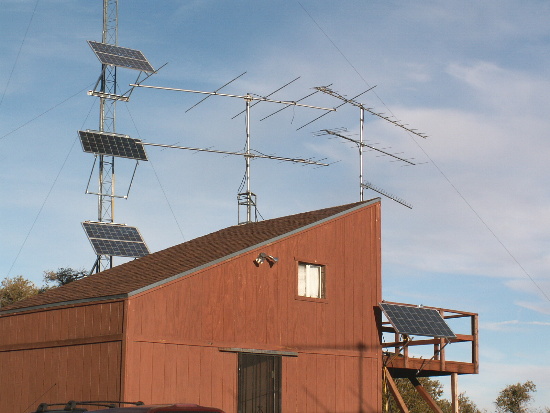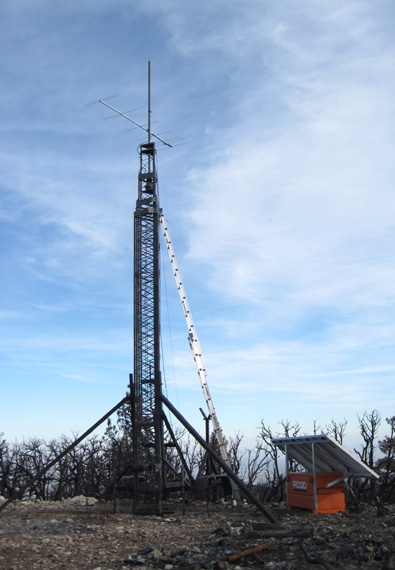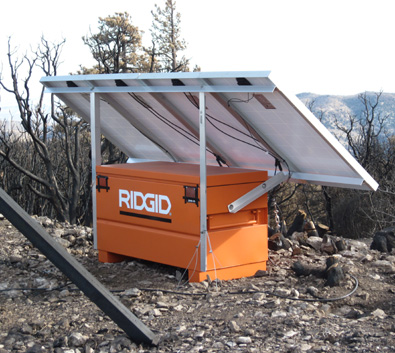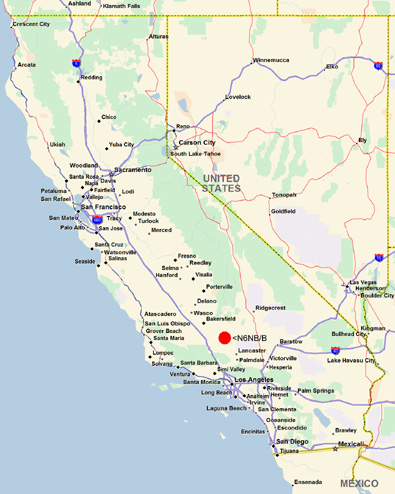VHF beacons
at the Tehachapi property
Taking advantage of the good VHF propagation
at the Tehachapi property, VHF beacon transmitters are on the air there
24/7 (except when there are fires or equipment failures). The first
two-meter beacon went on the air full time in 2003 with batteries recharged
by solar power. By 2008, beacons were operating on six meters (50.068
MHz), two meters (144.294 MHz) and 70 cm (432.294 MHz), providing a reference
signal on the three most popular VHF+ bands for propagation observations
and antenna or receiver adjustments.
After the cabin and almost everything else
at the property was destroyed by a fire on Sept.
4, 2011, a new two-meter beacon was set up within a few weeks even as the
post-fire cleanup continued. Here's how the setup looked at the original
cabin, pre-fire.
 On the tower behind the cabin, the top and bottom panels were pairs of
Matrix Solar 80-watt photovoltaic panels (four total). The middle
panel on the tower and the panel mounted on the cabin's deck handrail were
Kyocera 125-watt PV panels. They charged a bank of 12-volt batteries
having a total capacity of about 600 ampere hours. The panels were
mounted at steeper than optimum angles to minimize the time snow covered
the panels during the winter. After the fire, a new system was set
up with four 125-watt solar panels to charge a 450-ampere-hour battery
bank, initially housed in a steel job-site box.
On the tower behind the cabin, the top and bottom panels were pairs of
Matrix Solar 80-watt photovoltaic panels (four total). The middle
panel on the tower and the panel mounted on the cabin's deck handrail were
Kyocera 125-watt PV panels. They charged a bank of 12-volt batteries
having a total capacity of about 600 ampere hours. The panels were
mounted at steeper than optimum angles to minimize the time snow covered
the panels during the winter. After the fire, a new system was set
up with four 125-watt solar panels to charge a 450-ampere-hour battery
bank, initially housed in a steel job-site box.
The post-fire beacon's output on two meters
is about 50 watts into a small Yagi pointed northwest (about 315 degrees).
The two-meter beacon is regularly heard from Mexico to Sacramento, and
it has been heard as far north as southern Oregon and as far east as Utah
and Eastern Arizona.

This is the site of the N6NB/B beacon post-fire. The 70-foot crankup
tower on a trailer cannot be raised due to fire damage, but it appears
to be in no danger of collapsing. It is no longer safe to climb (if
it ever was). A tower that once supported a stack of HF antennas
(including a 5-element 20 meter beam) is now nothing more than a mast for
a small two meter Yagi. At right above is a photo showing more detail
of the steel job site box and solar panels.
The map at right shows the beacon site in the Tehachapi
mountains. At nearly 7,000 feet above sea level, the beacon has a
clear shot in many directions. If anything, the propagation is better
now than before the fire because the near field is so much more unobstructed.
|


|
<return to N6NB page>
|
 On the tower behind the cabin, the top and bottom panels were pairs of
Matrix Solar 80-watt photovoltaic panels (four total). The middle
panel on the tower and the panel mounted on the cabin's deck handrail were
Kyocera 125-watt PV panels. They charged a bank of 12-volt batteries
having a total capacity of about 600 ampere hours. The panels were
mounted at steeper than optimum angles to minimize the time snow covered
the panels during the winter. After the fire, a new system was set
up with four 125-watt solar panels to charge a 450-ampere-hour battery
bank, initially housed in a steel job-site box.
On the tower behind the cabin, the top and bottom panels were pairs of
Matrix Solar 80-watt photovoltaic panels (four total). The middle
panel on the tower and the panel mounted on the cabin's deck handrail were
Kyocera 125-watt PV panels. They charged a bank of 12-volt batteries
having a total capacity of about 600 ampere hours. The panels were
mounted at steeper than optimum angles to minimize the time snow covered
the panels during the winter. After the fire, a new system was set
up with four 125-watt solar panels to charge a 450-ampere-hour battery
bank, initially housed in a steel job-site box.